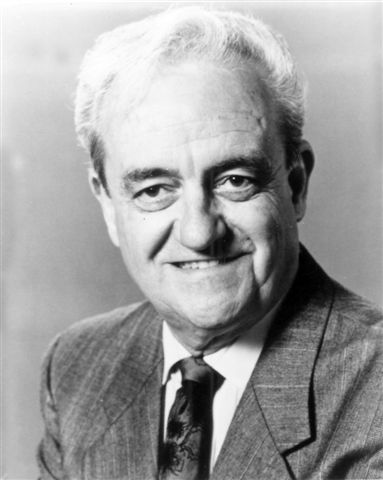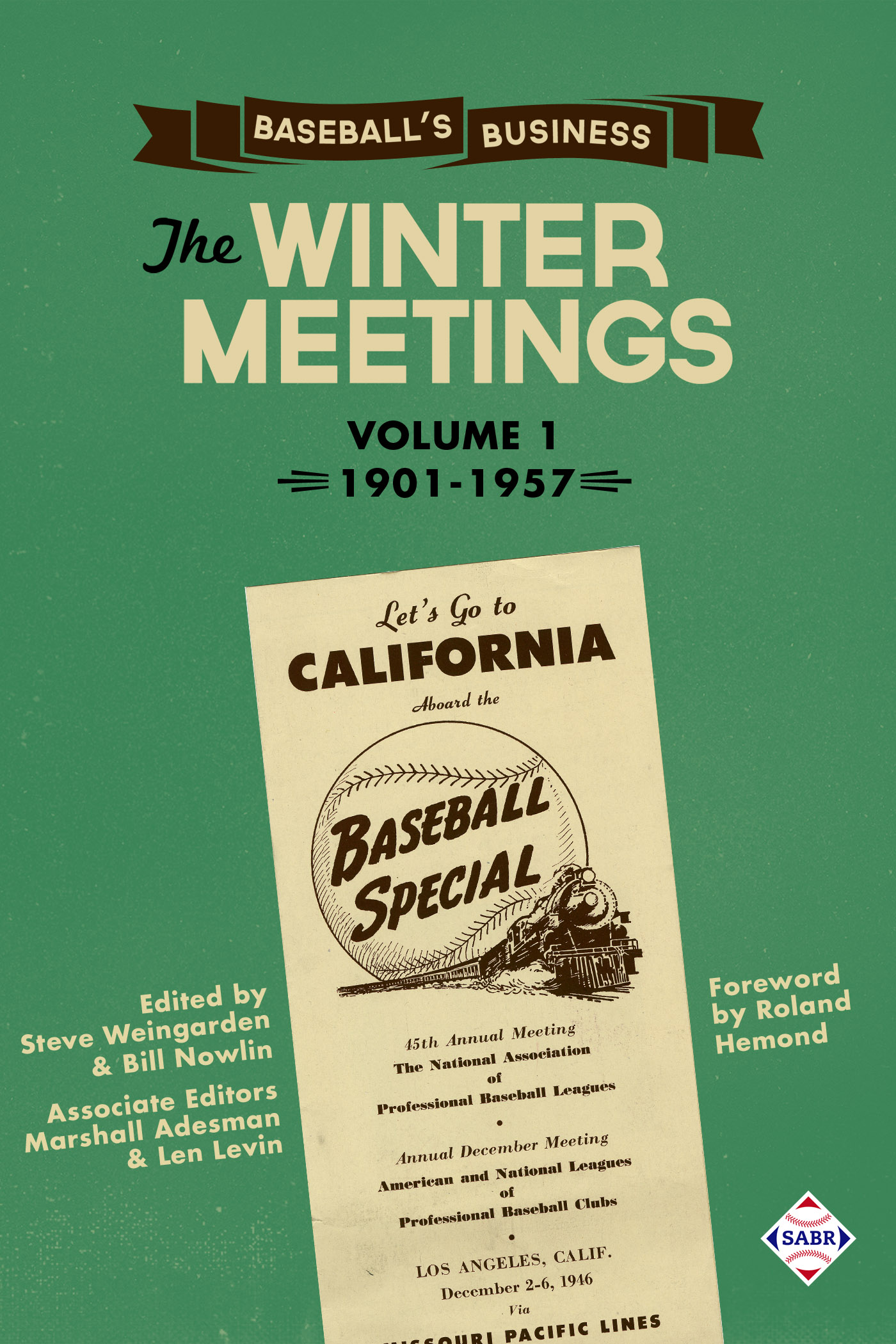Hemond: Treasuring my memories of the Winter Meetings
Editor’s note: Longtime MLB executive Roland Hemond wrote the foreword to our newest SABR Digital Library publication, “Baseball’s Business: The Winter Meetings: 1901-1957,” edited by Steve Weingarden and Bill Nowlin. Click here to learn more about the book or to purchase a copy.
By Roland Hemond
 The first Winter Meetings I attended was in 1952. I was with the Boston Braves, and we traveled by train from Boston to Phoenix — two-and-a-half days it took. I haven’t missed many of the Winter Meetings through the years. I know I went to at least 50 in a row, for sure.
The first Winter Meetings I attended was in 1952. I was with the Boston Braves, and we traveled by train from Boston to Phoenix — two-and-a-half days it took. I haven’t missed many of the Winter Meetings through the years. I know I went to at least 50 in a row, for sure.
I started in baseball working for the Hartford Chiefs. I used to unlock the ballpark in the morning and help Harvey Stone, the trainer, to sweep out the park. Clean it up and get the concession stands ready. Sell tickets in the afternoon and do some p.a. announcing sometimes. Then I would check in the ticket takers and the concessions people at the end of the night, and then lock up the park at 11, 11:30 at night. You wear all sorts of hats, but you’re getting your start.
1952 was my first full year with the Boston Braves. I joined them late in September ’51. I was typing up scouting reports and stuff like that. John Quinn was the general manager then. He was on that train. We picked up Bob Coleman, the manager, at Evansville. We picked up certain people as we would go along. There were about 8 or 10 people in the Braves party. My boss was John Mullen, the farm and scouting director.
We didn’t have computers then, so we had big boxes with all of our scouting reports. It was quite an adventure. I enjoyed the conversation. I did a lot of listening. I was a youngster, breaking in. I figured the best way to learn was to keep quiet and listen to these baseball people.
It’s strange today. When I drive to the office here in Phoenix, I see that building — the Westward Ho Hotel. It brings back the memories every time I drive by. Ted McGrew was a great old scout, and when we checked in, he called downstairs and said, “I want a tub of beer.” She said, “What do you mean, a tub of beer?” “Well, I’m going to fill the bathtub full of water. I need some ice and bring some cases of beer.” People would go to the bathroom and pick up a beer out of the bathtub.
I was always so deeply involved. We had to be well prepared for the Rule 5 draft, and then we had appointments with people for interviews, people who had applied for jobs. I tried to give people attention. Frank Robinson used to say, “I hate going to the winter meetings with Roland because we would never get back to our room.” People looking for jobs would be trailing me and they sort of knew how I got into the game … Frank would say, “I’ll see you later.” He would give up on me because I’d be interrupted all the time.
 They used to have two meetings. They’d have the minor-league meetings first. I’d go to both. One year with the Angels, we were flying back and as we were going to be landing in Los Angeles, the flight attendant came by and she had a great big plastic bag. She said, “You’re going to have to remove your shoes. We can’t get the landing gear down and if we do a belly-flat landing, your feet may go in different directions and the heels might strike somebody’s head and you might fracture somebody’s skull.”
They used to have two meetings. They’d have the minor-league meetings first. I’d go to both. One year with the Angels, we were flying back and as we were going to be landing in Los Angeles, the flight attendant came by and she had a great big plastic bag. She said, “You’re going to have to remove your shoes. We can’t get the landing gear down and if we do a belly-flat landing, your feet may go in different directions and the heels might strike somebody’s head and you might fracture somebody’s skull.”
We were all kidding around. We had traded Dean Chance to the Minnesota Twins for Jimmie Hall and Don Mincher. Manager Bill Rigney had been fooling with a lineup card and he said, “I’ll bat Hall third and Mincher fourth.”When that stewardess came by, I said, “Hey, Bill, you might as well tear up that lineup card. We’re not going to make it.” Sense of humor. We’d been drinking a little bit, I think. Then Bob Reynolds, the president, said, “Hey, Roland, go forward where Gene Autry is sitting and help him take his boots off.” I was on the floor, pulling his boots off and he said, “Isn’t it a shame? A cowboy can’t die with his boots on.” Fortunately, they finally got the landing gear down and we made a good landing. We were looking out there and they already had been putting foam on the runway.
Bill Veeck came to the White Sox and in ’77 we gave it a real good run again. We came back after a dismal ’76 season and made a good run that year against Kansas City. Working with Bill was a tremendous experience that I greatly treasure and will forever relish. It was a fantastic experience to be with him, in all facets of life. He was just an incredible man. He used to say, “Don’t bother preparing a budget, Roland. We don’t have any money. We’ll think of something.” We had a lot of fun and competed as best we could.
As a brand-new owner, he told me, “Let your imagination run rampant.” We were at the Diplomat in Hollywood, Florida, and I asked him, “What if we grab a table, and put up a sign that says, ‘Open for Business?’” He said,“What are you waiting for? Do it.”
John Mullen was with Atlanta or Houston then, I don’t remember. He said, “Gee, it looks like you’re running a meat market. I’m embarrassed for you.” I said, “I’m not embarrassed. We just got a trade offer.” I called Bill upstairs and I said, “Hey Bill, we’ve got a trade proposal already.” He said, “I’ll be right down.” We were there the rest of the day.
Bill had our PR man, Buck Peden, call on the phone every half an hour. Bill would answer and pretend another GM was calling: “Hey, Buzzie, how you doing?”— to make other clubs think we were doing business. About 10:15 that night, Bill told me, “We’re going to make four deals by midnight.” And we did. I went there on a coach ticket, and I came back first class with Bill.
As a GM or executive vice president of baseball operations for the Angels, the Orioles, the White Sox, and the Diamondbacks, yes, I was in charge of the whole operation at the Winter Meetings, but I had some good people working with me. You’re only as good as the people who are working with you. The scouts, your assistants … you don’t do it by yourself, by any means. It’s a people game, to me. You have to show recognition and praise to those who are helping you. Bill made it easy to make recommendations to him. Birdie Tebbetts was a good mentor, too. I had a multitude of people who helped me. John Mullen was perfect as a mentor. He had the knowledge and patience to teach various subjects, and was imaginative with even the basics.
Jerome Holtzman, when he was leaving Chicago, told me something, He said, “Roland, I really admire you. You never told me something I didn’t already know.” He never got any scoops. I respected those who would not want me to break confidentiality.
The last few years, it’s changed dramatically, with computers. People talk a different language. And actually a lot of times, they don’t talk to one another. They just email. I don’t think you get the personal touch. The laughs, the sense of humor that guys have. You have a good time and you close a trade.
I treasured going to the Winter Meetings. You don’t see people for a whole year and then here you are, face to face, and trying to make a deal.
ROLAND HEMOND has served as Special Assistant to the President and CEO of the Arizona Diamondbacks since 2007. During his sixty-year career in the front offices of Organized Baseball, he is a three-time recipient of the Major League Executive of the Year Award. Four awards have been named in his honor: by the Chicago White Sox, for those dedicated to bettering the lives of others through personal sacrifice; by Baseball America, for major contributions to baseball scouting and player development personnel; by SABR, for executives who display great respect for baseball scouts; and by the Arizona Fall League, for meritorious service to the League. In 2011 the National Baseball Hall of Fame awarded him the Buck O’Neil Lifetime Achievement Award.
Originally published: December 6, 2016. Last Updated: December 6, 2016.


